How Fair Is That Fair Trade Label?
Some of the “fair trade” logos slapped on products are helpful and some are meaningless. What's a shopper to do? Start by reading this primer.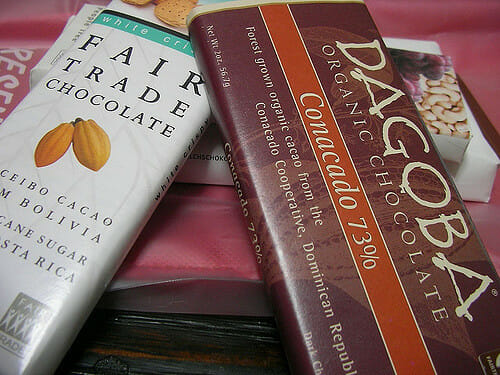 Fair Trade chocolate for Valentine's Day. (Hajime NAKANO / Flickr Creative Commons)
Fair Trade chocolate for Valentine's Day. (Hajime NAKANO / Flickr Creative Commons)
This article was produced by Local Peace Economy, a project of the Independent Media Institute.
If you consider yourself a conscious consumer, you might have stood before the chocolate section at your Whole Foods, reading label after label of “fair trade” logos, and wondered, what the heck do all these different certifications mean?
If you asked yourself that—you’re correct to wonder. There are dozens of “fair trade” logos slapped on products, and some are as empty as you might suspect.
But there are some certifications that do mean something, like no child labor was used in the creation of the product (ahem, fast fashion brands like Adidas and H&M).
Here’s a basic primer on “fair trade” to help you shop smarter, and bring more meaning to your purchases.
What “Fair Trade” Usually Means
We say “usually” because, well, merely using the words doesn’t mean the company adheres to all the principles of fair trade. According to Fair World Project, the principles of fair trade are:
Long-Term Direct Trading Relationships
Payment of Fair Prices
No Child, Forced or Otherwise Exploited Labor
Workplace Non-Discrimination, Gender Equity and Freedom of Association
Democratic & Transparent Organizations
Safe Working Conditions & Reasonable Work Hours
Investment in Community Development Projects
Environmental Sustainability
Traceability and Transparency
By meeting these points, a company is demonstrating their support for localized sustainability—not just environmentally, but also by ensuring workers are compensated justly across the supply chain, from the remotest parts of the world to your store. Fair trade principles should be found encompassing many of the products you purchase regularly, from produce, coffee, tea, and chocolate to non-food items like clothing.
“Fair trade” designation is especially helpful for those consumers unwilling or unable to purchase products from local farmers, regenerative fiber cooperatives, etc.
How “Fair Trade” Is Measured
There are two primary ways “fair trade” companies are measured: By third-party auditors and certifiers, and by member organizations.
Member organizations have companies that join and say they are “fair trade,” and perhaps meet some, or even all, of the criteria for fair trade. However, there isn’t always an on-the-ground auditing process to ensure these “members” of fair trade organizations are, in fact, meeting all those criteria, and there might not be an on-the-ground audit of what’s happening with their products in the home countries, such as in rural Guatemala, or Zimbabwe.
Certifiers provide a third-party audit of an entire company’s supply chain related to the product or company seeking “certified” fair trade status.
A company can be “certified” but not a “member,” and vice versa.
Some certifier labels to look out for:
Fair for Life (FFL): This label is issued by Ecocert, and according to the Fair World Project, has “strong eligibility requirements with a focus on marginalized producers.”
Fair Trade USA (FTUSA) and Fair Trade Certified: While this organization seems at one time to have been highly regarded, they are no longer endorsed by Fair World Project. FWP cites the organization ignoring concerns from small farm producers as well as falling short on living wage requirements.
Fairtrade International (FLO) and Fairtrade USA: This multi-member association of more than two dozen affiliated organizations works to develop fair trade standards, experts, and helps everyone from small producers to government bureaucracies understand and cultivate fair trade principles. They also have their own constitution.
Some membership-based labels to watch out for:
Fair Trade Federation is North American–oriented and devoted to “building equitable and sustainable trading partnerships and creating opportunities to alleviate poverty.”
World Fair Trade Organization (WFTO): This organization is “the only global network whose members represent the Fair Trade chain from production to sale,” according to Fair World Project.
Fair World Project is a comprehensive place to learn more about fair trade and its certifiers and meanings—especially since one of their primary purposes is “to keep eco-social terms meaningful.” That’s an important point and no easy task—just look at how everything from “handcrafted” to “natural” to “organic” has been corrupted.
The important takeaway is that some of those labels you’re seeing are more meaningful than others. Read them! Research them! And when you’re trying to evaluate the quality of a company, take a moment to learn about them, and avoid the ones who contribute to child labor, slave wages, and toxic work environment. Also: It’s not just about certifications. There’s a good chance your local farm is good on all points—but absolutely unable to afford proper certifications. Shopping local, where you can know your farmer and food sources, is always a good choice.
And, you can advocate in your community with your local co-ops, clothing and grocery stores for more, and genuine, fair trade products.
Your support matters…Independent journalism is under threat and overshadowed by heavily funded mainstream media.
You can help level the playing field. Become a member.
Your tax-deductible contribution keeps us digging beneath the headlines to give you thought-provoking, investigative reporting and analysis that unearths what's really happening- without compromise.
Give today to support our courageous, independent journalists.
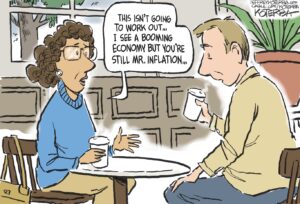


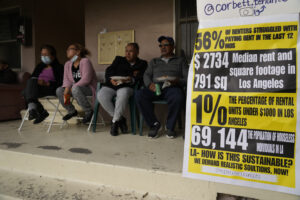
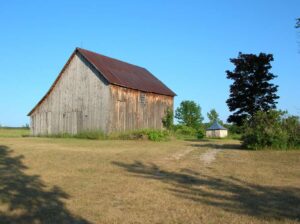
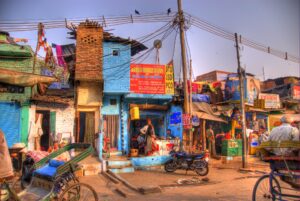
You need to be a supporter to comment.
There are currently no responses to this article.
Be the first to respond.